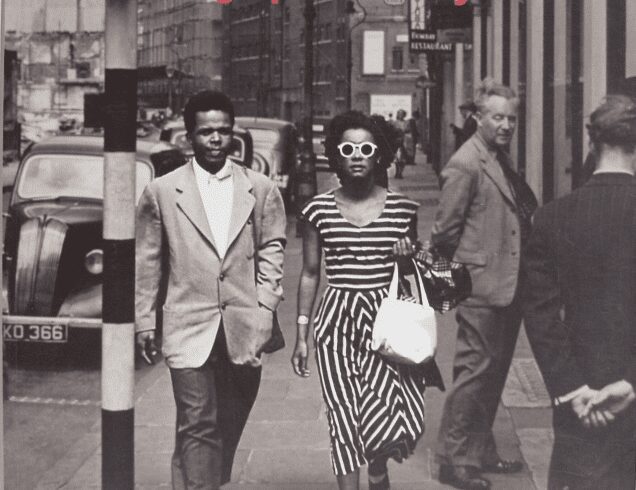Université Libre de Bruxelles, Brussels, Belgium
16 Nov 2017 - 17 Nov 2017

Cover Detail of "Black Britain - A Photographic History" by Paul Gilroy with Preface by Stuart Hall
This international conference aims at interrogating the emerging field of Black Studies in Europe and exploring its state of the art, by putting into dialogue scholarship and research developed in various European countries.
Over the last decades, the history and social trajectories of black populations in Europe have found a new prominence as black communities have become more visible in the public sphere in various European countries. Simultanuously, a new generation of scholars has expanded knowledge across a wide range of disciplines. They haye provided valuable insights into the development of minority identities, documented colonial and imperial heritages of Europe and shed light on people’s enduring connections with Africa, the Caribbean and the Americas. The conference will explore the contours and elicit the potentialities of an emerging academic field of black studies in present-day Europe.
Although it has long been existing on the other side of the Atlantic, where it found institutionalisation in the wake of post WWII black social movements in the US, the field of Black Studies is only emerging in Europe. Its development is uneven, however. Some European countries show a longer history and a more prolific scholarship than others in the study of people categorized as “Black”. Different approaches are being used, and different traditions are being formed. The relationships between scholarship, activism and the wider political landscape are more or less close, more or less explicit, more or less influential to each other, depending on the context. Although they all refer to the large, unavoidable, body of literature that has been produced on race and the black experience in the US, scholars in European Black Studies diversely engage with the concepts and theories that have been created in the American context and that mainly arise from a “middle-passage epistemology”, as Michelle Wright pointed out. The applicability of these concepts and theories in the European context, which show various histories of and relationships to blackness, is variously being questioned. Moreover, some scholars, although they address issues related to people categorized and/or identifying as “Black”, might not label their work “Black Studies”. The very subject of Black Studies, i.e. the “Black” subject, can also be understood in various ways. The question “who is Black?” has received diverse responses in the UK, France, Germany, or Belgium, for example, and definitions of blackness are far from being stabilized. However, efforts have been made during the last decade to put together research conducted in several European countries, i.e. to develop Black Studies at the European level, as several conferences and resulting publications such as AfroEuropa (e-journal launched in 2007), Black Europe and the African Diaspora (2009) or Africa in Europe (2013) testify.
The conference follows four lines of discussion: (1) How did “Black Studies” emerge in specific European domestic or regional contexts? Which concepts and theories are being used and/or developed? Where do they take inspiration from? How are transnational academic networks being developed? How are research agendas being framed? How do they relate to other relevant fields of study such as African Diaspora Studies, African Studies, Postcolonial studies, and Migration Studies? (2) Who is considered “Black” in European Black Studies? Is the very notion of Black Studies relevant across Europe, given the various definitions and lived experiences of “black” populations in Europe? Does “Black” equal, or goes beyond, “Afro-“ categories (“Afro-Dutch”, “Afro-British”, “African diaspora”, etc.)? (3) To what extent do research agendas interact with social movements and/or other forms of activism related to race, on the one hand, and with the political environment, on the other hand? How does academia articulate with activism and with political developments on migratory, postmigratory and postcolonial issues? (4) To what extent do research agendas converge at the European level? Can we define a common conceptual framework for the study of blackness and race relations across Europe? Moreover, what is to be considered Europe in European Black Studies, given the tension between political, geographical, and symbolic definitions of the continent?
Keynote speakers:
Michelle Wright (Emory University, USA)
Paul Gilroy (King’s College, London)
Kwame Nimako (BESS, the Netherlands)
Mireille Fanon-Mendès-France (Fondation Frantz Fanon, France)
Jean Muteba Rahier (Florida International University, USA)
Roundtable participants:
Jacqueline Andall (University of Tokyo, Japan). Geographical focus: Italy.
Véronique Clette-Gakuba (ULB), Sarah Demart (KULeuven), Nicole Grégoire (ULB), and Sibo Kanobana (UGent). Geographical focus: Belgium.
Iolanda Evora (University of Lisboa, Portugal). Geographical focus: Portugal.
Sarah Fila-Bakabadio (University of Cergy-Pontoise, France). Geographical focus: France.
Marta Sofía López Rodríguez (University of Léon, Spain) and Antumi Toasijé (Pan-African Studies Centre in Parla, Spain). Geographical focus: Spain.
Michael McEachrane (Raoul Wallenberg Institute for Human Rights, Sweden). Geographical focus: Sweden and Northern Europe.
Kwame Nimako (University of Amsterdam, The Netherlands). Geographical focus: the Netherlands.
Peggy Piesche (University of Bayreuth, Germany). Geographical focus: Germany.
Stephen Small (University of California Berkeley, USA). Geographical focus: UK.
The roundtable participants will talk during approximately 90 minutes, which will be followed by 30 to 45 minutes of extensive discussion including the audience.
The number of participants is limited; therefore register for the conference as soon as possible. To do so, please contact Geneviève Corbisier at lamc@ulb.ac.be and indicate which activity you wish to enroll for.
Additional activities
Thursday 16 November 5pm- 7pm: Decolonial Visit of Brussels with the Collective Colonial Memory and Fight Against Discriminations
Friday 17 November 7 pm- 8:30pm: Book Launch: 20 Questions & Answers on Black Europe, with Stephen Small (UC Berkeley)
(At Café Béguin, Place du Samedi 12A, 1000 Brussels, 1stfloor)
Saturday 18 November 10am -12am: Decolonial Visit of Brussels with the Collective Colonial Memory and Fight Against Discriminations
Conference entrance fee: €5
Decolonial Visit of Brussels: €5
LAMC – Institut de Sociologie
12ème étage
44 avenue Jeanne
1050 Bruxelles – Belqique
Téléphone: +32-(2)-650 37 98
Further informations: www.lamc.ulb.ac.be
Read the full program here.